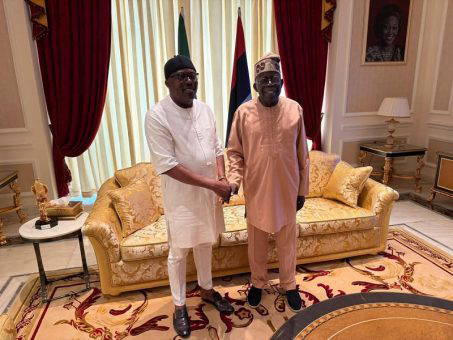News
Lagos Police Vow to Resist Any Planned Protest

The Lagos State Police Command has vowed to resist any form of planned protest, procession or gathering under any guise or nomenclature in Lagos State as the government and people of Lagos still nurture the wounds of the recent Endsars violence that wrecked havocs across the state.
In a press statement signed by the Command’s Public Relations Officer, SP Olumuyiwa Adejobi, the command informed the general public that “based on intelligence gathering from relevant intelligence agencies, some unpatrioric elements or group of people have concluded plans to orchestrate another set of violence in the state in furtherance to the recent Endsars violence, which has been analysed as dangerous and counterproductive.
The statement continued:
“Premised on this, the command, therefore, wishes to warn any individuals, group of students or any groups who might want to stage any form of protest, either “peaceful” or violent, or gathering whatsoever, to desist as the police and other security agencies will collectively and tactically resist any security threats or threats to public peace which might be triggered by protest or protesters in Lagos State.
“The Police command, emphatically, warns parents and guardians to discourage their children or wards from embarking on any protest in the state as the possibility of hijacking it by armed hoodlums to cause grieve and pains like the recent past is evident.
“We encourage the general public to ignore any call for protest and go about their lawful businesses as all hands are on deck to maintain law and order and public safety across the length and breadth of the state.”
News
2027: Backing Tinubu Not Guarantee for Second Term Ticket, Wike Mocks Fubara

Minister of the Federal Capital Territory (FCT), Nyesom Wike, has sent a veiled message to Rivers State governor, Siminalayi Fubara, saying support for President Bola Tinubu alone will not guarantee any election ticket.
Wike made the statement on Sunday during a public outing in Emohua Local Government Area of Rivers State.
His remarks were widely seen as directed at Governor Fubara, amid lingering political crisis in the State.
The former Governor of Rivers State said political loyalty must be tested during difficult times, not after power has been secured.
He mocked those he described as late supporters of President Tinubu, insisting that sudden alignment would not earn political rewards.
He said: “So the issue is not whether you are supporting Tinubu. That one, we have taken too long, long… Yes, oh. So Tinubu’s issue is not an issue again. Yes. Do you understand me? Yes. Tinubu’s issue is that nobody should be coming here to tell a day. We are for Tinubu; I am against you. Who is for Tinubu University? (laughs) That cannot give you any ticket oh! (laughs again) Direct, direct. It will not. Direction. Direction.”
Wike stressed that his political camp stood with Tinubu when the decision was unpopular. He said that support given under pressure carries more weight than alignment after victory.
He also recalled how the Rivers State House of Assembly openly backed Tinubu early, long before the election outcome was certain.
According to him, some of those now making public declarations were absent during the critical period.
“The same people now who came to declare, put them to God… But they should declare they are saying it for a candidate. Yes. Don’t you see characters? (laughs) So I send the sword far ahead of them.”
Wike further spoke on governance and continuity. He defended projects and agreements initiated during his tenure as governor. He said it is often difficult for successors to acknowledge past efforts, even though government is a continuous process.
His comments come weeks after Governor Fubara formally aligned with the All Progressives Congress (APC), the party of President Tinubu.
The move followed months of political crisis in Rivers State, which led to federal intervention and a declaration of emergency rule.
Political watchers believe Wike’s remarks constitute a direct response to Fubara’s recent positioning as a key Tinubu ally in Rivers politics. Critics argue that Fubara’s support surfaced only after the political storm had settled.
Wike, who remains a dominant force in Rivers State politics despite serving in Abuja, appears to have drawn a clear line ahead of the 2027 elections.
He suggested that political tickets would be decided by proven loyalty, not convenience.
Videos from the event in Rumuche, Emohua, spread rapidly on social media. Many users described the speech as a coded warning to the governor.
As of press time, neither the Rivers State Government nor Wike’s media team had issued an official clarification.
The comments, however, suggest that the political rift between both camps is still active, despite earlier peace moves brokered at the national level.
News
ADC, LP Knock Tinubu for Jetting Out to Europe Amid Security Crisis

The opposition African Democratic Congress and the Labour Party on Sunday criticized President Bola Tinubu for departing Nigeria for Europe on holiday at a time the country is grappling with rising insecurity, including foreign military interventions in the North.
The Presidency announced on Sunday that Tinubu left Lagos for Europe for his end-of-year holiday ahead of an official visit to Abu Dhabi, United Arab Emirates, where he is scheduled to attend the 2026 edition of the Abu Dhabi Sustainability Week Summit.
President Tinubu’s Special Adviser on Information and Strategy, Bayo Onanuga, explained that the trip was by invitation from His Highness Sheikh Mohamed bin Zayed Al Nahyan, President of the UAE, to participate in the summit, which gathers global leaders from government, business, and civil society to advance sustainable development strategies.
“His Highness Sheikh Mohamed bin Zayed Al Nahyan, President of the United Arab Emirates, has invited President Tinubu to participate in the 2026 edition of Abu Dhabi Sustainability Week Summit, which will take place in the emirate early in January,” the statement read.
Reacting to Tinubu’s departure, the ADC, in a statement by its National Publicity Secretary, Bola Abdullahi, faulted the timing as inappropriate given the security challenges facing the country.
The ADC noted the deadly terrorist bomb blast in Zamfara and the ongoing foreign military involvement, calling the President’s move insensitive.
“President Bola Ahmed Tinubu’s lack of care is alarming. In the wake of another deadly bomb blast in Zamfara, and following an unprecedented foreign military attack on Nigerian soil, the nation is waiting for reassurance from its leader. Instead, we learn the President has gone on holiday. What a President!” Abdullahi said.
Similarly, LP’s acting National Chairman, Senator Nenadi Usman, described the trip as “insensitive and devoid of empathy” for Nigerians facing violent attacks and humanitarian crises.
Speaking through her Senior Special Adviser on Media, Ken Asogwa, she stressed that the President should have remained in the country to coordinate security responses.
“This is the most inauspicious time for the President to leave the country. Even the Christmas holiday in Lagos seems ill-timed, given that a bomb exploded in Zamfara today, killing nine people,” Usman said.
She further alleged that Nigeria was under external attack and accused the government of downplaying the severity of the situation.
“Nigeria is under attack by a foreign nation. No matter how the government tries to frame this, it is a violation of our sovereignty. This is the time for the commander-in-chief to coordinate the response, not embark on a holiday,” Usman said.
She added that the President had not convened critical security meetings since the U.S.-led bombardment of terrorist camps in Kwara and Sokoto States and condemned the perceived lack of engagement with military leadership.
The President’s trip comes amid heightened security concerns. On Thursday, U.S. President Donald Trump authorised AFRICOM to conduct airstrikes on terrorist camps in Sokoto State, hours before Nigeria’s Ministry of Foreign Affairs acknowledged the operation. A deadly bomb blast in Zamfara on Friday claimed several lives.
The 17th edition of Abu Dhabi Sustainability Week will run from January 11 to 15 at the Abu Dhabi National Exhibition Centre under the theme “The Nexus of Next: All Systems Go.”
The event aims to connect innovation, finance, and people to advance sustainable development.
Onanuga confirmed that Tinubu would return to Nigeria after the summit.
Hosted by Masdar, the UAE’s clean energy company, the summit will feature the invitation-only ADSW Summit, the World Future Energy Summit, the Zayed Sustainability Prize Awards Ceremony, and specialised sessions on hydrogen, climate finance, water security, and utilities in the Global South. Organisers expect more than 50,000 participants from over 170 countries, featuring over 700 global brands and exhibitions of emerging clean technologies.
The UAE Minister of Industry and Advanced Technology, Dr Sultan Al Jaber, noted that ADSW 2026 builds on two decades of the UAE’s leadership in renewable energy.
Tinubu previously attended the Abu Dhabi Sustainability Week in January 2025, where he held meetings with Gulf investors and officials on trade, energy cooperation, and climate finance.
Since assuming office on May 29, 2023, Tinubu has undertaken at least 46 foreign trips, spending an estimated 192 days abroad as of October 2025. In 2025 alone, he travelled internationally no fewer than 15 times to countries including Ghana, the UAE, Tanzania, France, Italy, Saint Lucia, Japan, and Brazil for summits, bilateral engagements, and holidays.
News
Food for Living: Life is a Mystery

By Henry Ukazu
Dear Destiny Friends,
Ever wondered how one sleeps and wakes up? Ever wondered where the spirit goes while we sleep? The answer is hidden in mysteries because life, and by extension, existence, is full of mysteries.
On a personal note, I do believe that whenever we sleep, we are basically practicing how to die because no one knows the whereabouts of the spirit and souls. All we know is that we wake at the break of dawn, or when there’s a stirring, either naturally or artificial. That is a mystery!
Have you also ever imagined how a man will have sexual intercourse with a lady and a child is born? Have you also ever wondered about the mystery surrounding death? Have you also imagined how human beings fall in love with the opposite sex despite various variables. Again, each time I fly in the air, I begin to wonder about the invention surrounding the aeroplane. So many questions begging for answers. The mysteries surrounding life is inexhaustible.
For the benefit of hindsight, life is indeed a mystery. Sometimes, we think we understand it, and other times, it humbles us with its complexities. Life can be likened to a woman; the more you try to understand them, the more confused you become.
I had to give this introductory analysis to buttress the significance surrounding the mysteries of life. Why do I say this? Nothing is permanent in life, and as such anyone can be great and successful tomorrow. In my native Igbo (Nigerian) language, we have a saying that “nobody knows the stomach that will birth a king tomorrow”, and “tomorrow is pregnant”. These are evidence of the mysterious nature of life.
In my journey through life, I have met angels and devils in human form, who have played different roles in shaping my thoughts and outlook towards life. While I thought certain people will bring smiles to my life, they turned around to make me question their intentions and mindset. But the people I had some reservations with turned out to be some of the best things that have happened to me. For instance, I have a dear friend turned brother, whom I hold in high esteem. His name is Sodeeq Sulyman. He is the Chief Operating Officer of my company.
As a matter of fact, today is his birthday. He met me on X and reached out to me to be his mentor. I was literally humbled because that was the first time someone was making a firm request of me. I gladly accepted the request, and today our friendship, brotherhood and relationship has truly blossomed. This young man is literally one of the best things that has happened to my life. If I was told he will change the outlook of my life, business and life generally, I wouldn’t have believed it.
But as my late mother would always say, when you meet people just take the good part and leave the bad part. In all sincerity, I strongly believe our meeting was predestined, and mysterious if the circumstance of our meeting is x-rayed.
Here is the message, never look down on anyone except you are helping them to do something or pick something. Another message is don’t give up on anyone because you don’t know what tomorrow will unfold. Even the Bible book of life states in Proverbs 118:22, “the stone which the people rejected has become the cornerstone”. So, it’s instructive for one to be kind, courteous and humble in relationship with human beings because nobody knows what life will unfold tomorrow.
Imagine, if I had not treated this young man very well or even accepted him, I would probably have met other minds, who would have given me an experience of a lifetime I wouldn’t forget in a hurry.
The mystery of life can be seen in wealth creation. A man of means today can become a beggar tomorrow if the wealth is not properly managed, and the child of a certified pauper can become a man of means tomorrow. There have been stories of wealthy men whose children mismanaged their parents’ and became hungry, while slaves of wealthy men became stupendously wealthy. What does that tell you? Nothing is guaranteed in life. I often wonder how people take life very seriously thinking everything is about them. They don’t even know they can sleep and not wake up the next morning, nor are they aware of the fact that pride and ego are the two greatest enemies that can fast track the downfall of a man, while humility can jump-start their elevation.
As human beings sometimes, we wonder where our next meal will come from. Where would our next business, money, spouse, opportunity come from are some of the questions that bug our minds? One might have a business that has little or no hope of succeeding, but with determination and favour from God, the business will turn around for good.
On a personal note, I have been in a scenario where I lost hope of succeeding or moving to the next round, but I was surprised when the universe came through in ways and manners I couldn’t comprehend. I believe we all have one story or another to share as it relates to the mysteries of life. I can vividly recall when my late dad was very sick in the hospital. As a matter of fact, he was adjudged to be the sickest patient in the hospital. The doctor who was treating him said, he lost his mother to the exact sickness my late dad was facing. But with prayer, my late dad was able to survive to the amazement of everyone. He was later adjudged to be a miracle patient because he was given a slim opportunity to survive.
I don’t know what your storyline might be nor do I know what you are experiencing in your academic, business, health, career, or family life. One message I have for you is that nothing lasts forever. If you give it time, one day you’ll laugh and thank God for the experience and lessons life has offered you because life is a mystery one may not understand. It unfolds as it chooses.
Henry Ukazu writes from New York. He works with the New York City Department of Correction as the Legal Coordinator. He’s the founder of Gloemi. He’s a Transformative Human Capacity and Mindset coach. He is also a public speaker, youth advocate, creative writer and author of Design Your Destiny Design and Unleash Your Destiny . He can be reached via info@gloemi.com






